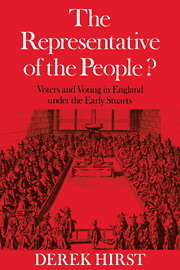8 - Local benefits, and taxes
Published online by Cambridge University Press: 15 December 2009
Summary
The House of Commons was, in terms of numbers, directly representative of perhaps about one-third of the adult male population. There remains the question of the form this representation took. Did the voters take their turn at the hustings and then go home, forgetting and forgotten, or did the member maintain close and constructive links with his constituency? In other words, were the wishes and interests of the people outside parliament effectively represented?
Monarchical political theory would have argued that the question was unnecessary, since the King, as head of the body politic, filled the position of representative. This view found its most powerful expression with Hobbes, who contended that Parliament's claim to representation was a sham; its practical consequences can be seen in the Earl of Northampton's anger at the Commons' claim to be uniquely capable, by virtue of their representative status, of advising the King of the country's ills, which he thought implied that ‘the Kinge slept oute the sobbes of his Subiectes, untill he was awaked with a thunder bolt of a parliament’. But the outbreak of the propaganda war of 1641–3 made it obvious, if it had not been so already, that such notions of the relationship of king to people were strongly challenged. The major single work of the period 1640–60, Henry Parker's Observations, legitimated Parliament's stand in mid–1642 by developing the concept of the derivation of power from the people, and this power was of course directly transmitted to the members of the House of Commons.
- Type
- Chapter
- Information
- The Representative of the People?Voters and Voting in England under the Early Stuarts, pp. 157 - 177Publisher: Cambridge University PressPrint publication year: 1975



